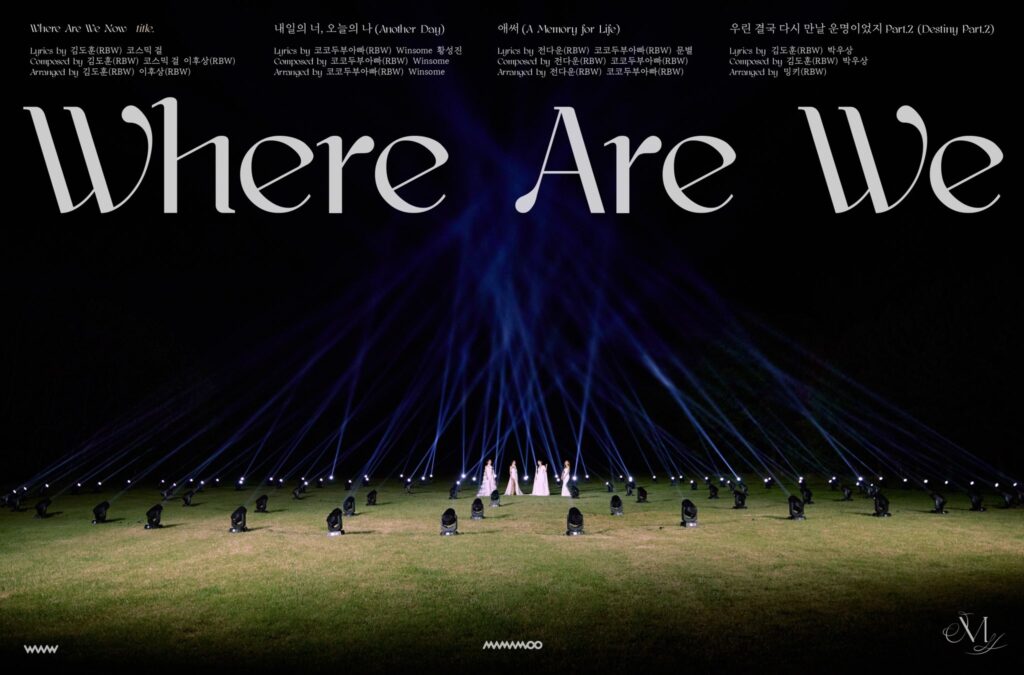
After embarking on their solo projects, Mamamoo is back with their 11th mini-album, WAW. While Mamamoo’s last few title tracks were fun, sassy, and empowering, this album took many by surprise with its 180° turn. Releasing an album in their seventh year as a group, the quartet showed what they are all about — their vocals. Although long acknowledged for their heavenly vocals, Mamamoo never had the chance to do a ballad-focused comeback. That is until this summer.
WAW marks a significant slow down from their previous pop-infused title tracks while marking a shift to the emotional yet classy title track, “Where Are We Now”. Like their title track, the album relays bittersweet stories, connecting with their sentimental side while going back to basics. Having broken the seven-year curse, their title track, “Where Are We Now”, speaks about the anxieties of the future, “Where’s the end? Do we even have an end?” The truthful track that speaks of their years together kicks off the album with a magnificent but melancholic tone.

While Wheein’s light vocals along with the echoing effect in the pre-chorus before Hwasa leads the first chorus is goosebump-inducing, it is the toning down of the instrumental before Hwasa takes over in the last chorus that truly proves the grandeur of the track. Moreover, having Hwasa, followed by Solar in the chorus creates a dramatic yet emotional listen. In other parts, Wheein’s voice is most certainly angelic, in contrast to Hwasa and Solar’s deep and soulful voices. Coupled with an overarching colour scheme of black and white, “Where Are We Now” paints a dreamy yet painful picture.
Of course, harmonising is never a problem when it comes to this vocal powerhouse. With their harmony most evident in the chorus, it makes me feel as if I should be paying to listen to this breathtaking piece. Their vocals are spotlighted with the striking but non-overpowering instrumental, creating a dramatic but intense and emotionally charged track. My only gripe is that Moonbyul should be utilised more when harmonising, else, it would have been a perfect ballad in my books.
Moving forward from the sorrowful cries in “Where Are We Now” comes the lighter tracks, “Another Day” and “A Memory for Life”. Sandwiched between two heavy tracks, “Another Day” and “A Memory for Life” are the type of songs that would hit the hardest at 3 a.m. While “Another Day” is a personal favourite as an easy listen, the lack of vocal harmonization as heard in the title track renders it similar to any other K-drama OST. It almost feels as if there should have been a visual aid to accompany it for the maximum tear-jerking effect. Yet, what compels another listen is its lyrics. “Another Day” concerns leaving a relationship that has lost its meaning and for that, Mamamoo should be applauded for their ability to convey the feeling of heartache.
Tomorrow’s me may regret and have a hard time
Again today I am in tears in our memories
My heart has a gap that I can’t even fill
Now I’m not confident to pretend I don’t know
“A Memory for Life” is slightly jazzy and feels like the slowest moving track. The heavier and almost draggy instrumental, coupled with the jazz interlude at the end of every chorus further dramatises it. While Wheein’s lower register here was absolutely pleasant on the ears, her ending was an abrupt stop. But who knows? It could have been an informed creative choice to mimic the feeling of a sudden parting.
Up till this point, “Another Day” and “A Memory for Life” seem to both recount experiences of time, memories, and parting. While it carries a coherent message, putting two rather similar tracks back to back almost blends them in with one another. Yet perhaps, it was intentional, especially when “A Memory for Life” and “Another Day” can be viewed as a reflection of one another.
“Destiny Part 2” should ring a bell for Moomoos. While “Destiny” boasts their trendy side and is made for live performances, “Destiny Part 2” showcases an intimate and mature image to them. While it seems like Mamamoo only made slight changes, “Destiny Part 2” certainly holds a different meaning for Moomoos, functioning almost like an opening of a new chapter.
Without a doubt, the most obvious changes concerns removing their English intro and adapting their Wild-West-influenced and angst driven instrumental to a noticeably slower piano melody. Granted the lack of audience, the hypnotic and singalong element, “da da da”, from the chorus was also removed. Taking away the element of fun, one that Mamamoo rode on during Queendom, “Destiny Part 2” elicits a sombre feeling from the get-go.
A more notable but subtle change involves their lyrics. In “Destiny”, Mamamoo focuses on the external (“You pushed me away without any regret”) while “Destiny Part 2” focuses on the internal self (“I pushed you away without any regret”). Although it is easy to miss, this subtle shift marks Mamamoo’s subversion of the typical summer dance genre that K-pop hops on.
To further emphasise their monumental change, the lyrics in “Destiny Part 2” carries a different weight despite mostly mirroring “Destiny”. On this account, “We went on different paths, we found each other again” feels even more powerful, especially after finding their own colour in their solo projects and coming back as four last week. While part of the album echoes their reunion and loyalty to one another and their fans, others have also speculated that WAW marks their impending disbandment.
For a track that looks like a simple remake on the surface, “Destiny Part 2” speaks of something bigger and brighter for Moomoos. It celebrates Mamamoo’s close-knit friendship while drawing out a sense of nostalgia from fans. At the same time, it ties in with their numerous references to their friendship in their documentary film where they shared heartfelt feelings about only having each other to rely on.
Although the album was a breath of fresh air amidst the summer dance-focused comebacks, to a certain extent, the tracks do blend in with one another. On one hand, it sounds cohesive, as if painting a bigger picture with each track as the detailed strokes. On the other hand, the lack of variation felt heavy and tiring upon consecutive listens. But after all, Mamamoo is about vocals and the album’s merit reflects just that. Having an album that goes back to basics to display their vocal prowess in their tracks is undeniably praiseworthy. With that, Mamamoo delivered exactly what they had set out to deliver.
(Naver, Youtube [1][2][3]. Lyrics via Genius. Images via RBW Entertainment)


